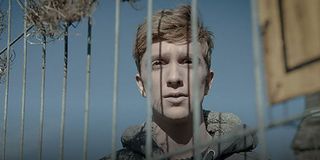In The Flesh Season 2: A Look Back And A Look Ahead

For those unfamiliar with In The Flesh, the post-zombie series is a BBC drama which airs on BBC America in the U.S. Like many TV programs transplanted across the vast ocean, fans in America get the series a little later than their U.K. counterparts, but that also means Americans get to play less of a waiting game where renewals are concerned. Season 2 of In The Flesh was greenlighted before the show even premiered stateside. Now, just a short time after the show appeared in its native habitat, we’ll be getting Season 2 on our TVs. If you didn’t get on board for the first round, or need a bit of a refresher course, here’s a look at what you missed during In The Flesh’s short first season, and what you should be looking forward to.

Basic Premise of The Series
Like any good supernatural drama, In The Flesh features plenty of backstory explaining why there are zombies in the show’s world, as well as how the community is coping with a world filled with mostly dead ladies and dudes. Here’s the basic gist: Back in 2009, people’s loved ones began to quite literally rise from the grave. These were zombies of the vicious type we’ve come to know and love from movies like Zombieland and World War Z. Clearly, the living got busy protecting their own, starting a chain of events known as The Pale Wars.
However, In The Flesh isn’t really about the wars between zombies and humans. Instead, it’s a drama about life after the zombie apocalypse. In the wake of many human deaths and zombie re-deaths, modern science figured out how to calm those suffering from Partially Deceased Syndrome (PDS). They take a daily dose of heavy drugs and wear makeup and contacts in order to fit into everyday society. Regardless, even though the former zombies are mostly like regular people, society is still living with the ramifications of their former rabid actions and intolerance is rampant.

What We Saw Last Season
In The Flesh offered a rather short first season. The BBC only produced three episodes of the series, but a lot of information could be gleaned about the underlying turmoil in society during those eps. The series mostly followed a young man named Kieren (Luke Newberry), who committed suicide in 2009 before being revived as a PDS sufferer. During the first season, we saw Kieren deal with depression about his current status. He had nightmares about the people he destroyed before the drugs were invented to return him to an almost human state. He often hid the fact that he was “a rotter” and spent much of his time wandering around in the country—away from society.
Most of the action during Season 1 focused on Kieren and the rest of the PDS zombies living in his area as they tried to hide from the clutches of the Human Volunteer Force, a group of humans who weren’t ready to put the past behind them. They wanted vengeance while many of the zombies simply wanted to move on. They took vengeance while many of the zombies hid in their homes, afraid. The series was big on touching on issues of racism and violence, and was quite adept at showing different personality traits, including many individuals who were either bigoted, afraid or both. It was an interesting take on zombies featuring a universally recognizable theme but a fresh take on the genre. It’s no wonder the BBC would want to tackle a few more episodes this time around.
CINEMABLEND NEWSLETTER
Your Daily Blend of Entertainment News

What We Might See This Season
Kieren’s not exactly a brave or bold individual (he did, after all, commit suicide after a relationship didn’t work out), and his temperament looks as if it will be unchanged during the new episodes of In The Flesh. While the series takes a rather quiet approach to marketing, previews for Season 2 of the drama have shown a world that is still filled with turmoil and distrust. Just check out how Kieren’s family is dealing with their undead son, below.
Season 2 was focused on Kieren’s small community and the growing anti-PSD sentiment in the town. In Season 2, the world should expand somewhat, including an entire plotline devoted to a radical government party known as Victus, which can only be described as “Pro-living.” That’s a cute play on words, but it could mean disastrous things for Kieren and his fellow rotter friends and community members should the party gain any sort of traction.
Honestly, one of the ideas I have found most compelling about In The Flesh revolves around the fact that everyone deals with the partially diseased in a different manner. Many people begrudgingly or excitedly accept their returned loved ones and try to get on with their lives, but there are an equal number of people who can’t let the past lie. They are angry, and that anger can manifest itself through segregation, violence, political antics and much, much more. Though I would never call In The Flesh a particularly violent or action-oriented series, it is a fascinating series, and as the show’s world expands, there should be an abundant number of complications the writers can forge into. Now, if they could just throw in a zombie love interest this show will really have me sold.
BBC America loves to premiere programming on Saturday evenings. So, if you are a homebody, you can be the among the first U.S. folk to catch the series on May 10 at 10 p.m. ET. For anyone else with a modicum of interest, I highly suggest dropping In The Flesh into your DVR lineup.

Jessica Rawden is Managing Editor at CinemaBlend. She’s been kicking out news stories since 2007 and joined the full-time staff in 2014. She oversees news content, hiring and training for the site, and her areas of expertise include theme parks, rom-coms, Hallmark (particularly Christmas movie season), reality TV, celebrity interviews and primetime. She loves a good animated movie. Jessica has a Masters in Library Science degree from Indiana University, and used to be found behind a reference desk most definitely not shushing people. She now uses those skills in researching and tracking down information in very different ways.
Most Popular







